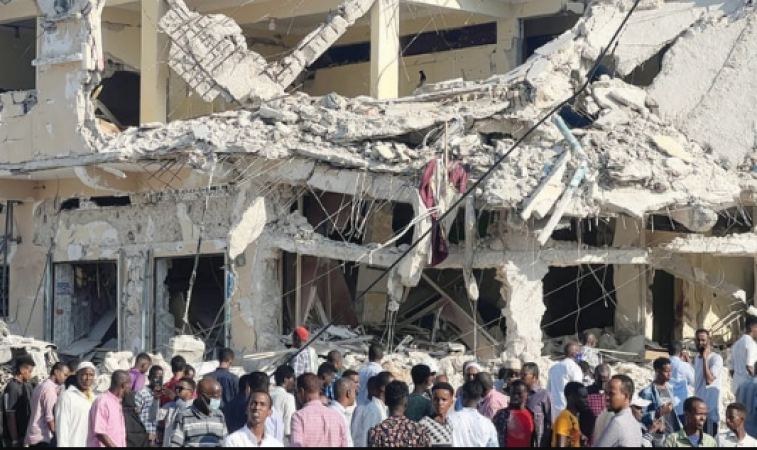
Mogadishu: Somalia's president has made a strong appeal for foreign aid for those injured in the deadly car bombings over the weekend that killed 120 people.
On Monday, bulldozers were also clearing debris from the blast site in the capital Mogadishu to search for any bodies that may be buried under the rubble.
The al-Shabaab group claimed responsibility for the attack on Saturday, which injured more than 300 people and was the deadliest in the fragile Horn of Africa in five years.
In a statement issued on Sunday, President Hassan Sheikh Mohamed called on the international community, Somali brothers and other Muslim brothers and partners to send medical personnel to Somalia to help treat the injured.
Also Read: VIDEO: 'Qayamat Ka Din Pass Hai..,' Muslims angry after 'Halloween' celebration
He said the death toll could rise as overburdened, low-cost hospitals struggle.
After decades of conflict, Somalia has one of the world's most vulnerable health systems and has been plunged into chaos since the overthrow of President Siad Barre's military regime in 1991.
"We are unable to airlift so many injured people, so please send us any assistance," Mohamed said. Schools have been closed by Prime Minister Hamza Abdi Barre so that students can participate in the National Blood Campaign. According to Mohamed, a few hundred people donated blood to the hospitals that took care of the victims.
On Sunday, the World Health Organization announced it was ready to assist the government in treating the injured and offering trauma care.
A group with ties to al-Qaeda named al-Shabaab as the perpetrator of the attack, in which two cars loaded with explosives exploded about two minutes into the city's busy Zobe square, followed by a shootout.
It claimed that the country's education ministry was its target.
Also Read: Hong Kong is eligible to become a hub for global fintech
The explosions sent plumes of smoke and dust into the air as they broke down walls and shattered windows of nearby buildings. According to Ali Yare Ali, a local government official in Mogadishu, seven to nine bodies may be buried under the rubble of buildings damaged by the explosion.
The deadliest attack in Somalia, killing 512 people and injuring more than 290, occurred at the same intersection where a truck carrying explosives exploded on October 14, 2017.
The bombings were condemned by Somalia's allies along with the US, the United Nations and the African Union for doing so in statements of support. The attack jeopardizes the security of the country, including the capital of about 2.5 million people.
Mohamed declared on Sunday that "the Somali nation and these terrorists are at war, and as I speak, fighting is taking place in many parts of the country."
We are waging war against them and killing each other.
Mohamed called on all Somalis to come together in support of those affected by the attack.
He praised the donation of water, food and clothing to the survivors and said, "We must unite to provide assistance to the families, children and parents of those who were martyred."
It was not immediately clear how the explosives-laden cars managed to pass all the checkpoints around the coastal city. When the first explosion occurred, according to eyewitnesses, there were lines of tuk-tuks and other vehicles on the road.
A second explosion, which killed older people and women carrying children on their backs, was found by emergency personnel. Police officer Adan Mohamed said on Sunday that he had trouble sleeping the night before because of the horrific scene.
Also Read: Pak PM Shehbaz to discuss CPEC expansion with China
Since Mohamed was elected in May and declared an "all-round war" on terrorism, al-Shabaab fighters have increased their attacks in Somalia.
In August, the organization attacked Mogadishu's famed Hyatt Hotel with guns and bombs for 30 hours, injuring 117 people and killing 21. Rebels have been trying to topple the Mogadishu government for nearly 15 years.
Despite being driven out of the capital by an African Union force in 2011, the group still controls large areas of the countryside, and they continue to carry out deadly attacks on civilian, political and military targets.